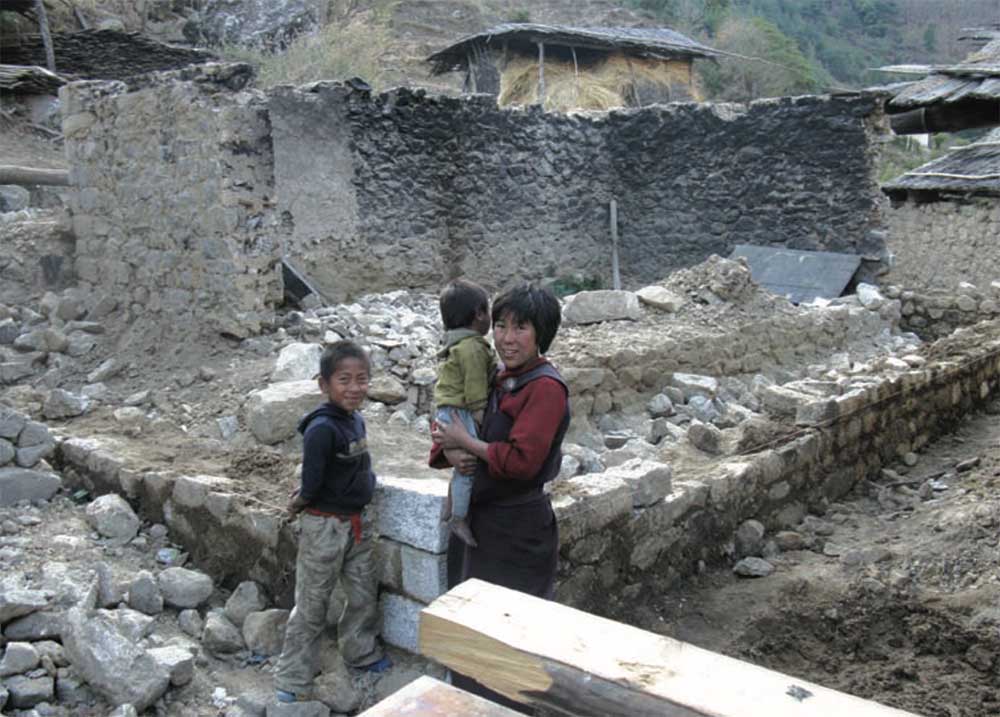Trashigang awaits completion of procedures, Mongar to issue permits soon
Tshering Palden
With repeated tremors in the past few months victims of the September 21 earthquake in the eastern region are taking to the government’s proposal of building single-storey homes.
But they are also growing anxious about how or when they would be provided with timber, which some had applied three months ago.
Naku, 48, from Narang, went twice to the gup’s office and visited the forest office in Drametse, Mongar. “I’m willing to pay for the timber as it is my urgent need at the moment,” he said. “But forest officials said since my house is damaged by the earthquake it has to come from the headquarters,” he said.
Naku lived in his kitchen next to the rubbles, which was once his ancestral home that was razed to the ground by the September earthquake. He was driven out of the kitchen by the December 31 earthquake that destroyed his kitchen. Since then his family, including his five children, have been living in a temporary shed built from bamboo mats and planks.
Despite recent decisions to decentralise the process of issuing timber for reconstruction purposes, the timber has still not reached the villagers even after two weeks.
People are worried because timber requires seasoning before it could be used to build houses. “It’ll take a couple of months for the timber to season (dry),” said Ngawang Dorji, from Bainang under Yangneer. “We can’t use fresh timber.”
With potato plantation works nearing, farmers are worried about not being able to find the labour to obtain the timber when the approval arrives. “Everyone will be into potato cultivation, children would have gone to school, and there would be hardly anyone to help us with carrying timber and rebuilding,” said Chimi Dorji from Changzay.
Repaired houses in Kanglung and Lumang suffered damages from the December 31 earthquake. “People had applied concrete cement to minor damages on their homes,” said Tshewang Norbu from Moshi under Lumang gewog. “The recent earthquake damaged that too.”
An increasing number of villagers are already rebuilding their homes in the hope to beat the monsoon.
The government’s intentions to train local artisans on windstorm and seismic resistant features in a building were cut short by lack of funds.
While Trashigang dzongkhag awaits the completion of procedures, Mongar is about to start issuing timber permits soon. A list of 399 households was submitted to the divisional forest office in Trashigang. “We’ve submitted the list. It’s just a short formality,” said the Trashigang planning officer. “We’re not sure whether NRDCL or the dzongkhag would carry it out.”
He said regular timber permits have been issued before the order of the government was issued.
The Mongar divisional forest officer said that a committee comprising forest, dzongkhag and gewog officials would start issuing permits and marking the trees within the first week of February. A total of 1,500 CGI sheets were distributed in Mongar.
The government earlier (including the prime minister and the home minister) criticised the villagers for having compromised on basic traditional building techniques that made their homes more vulnerable to tremors. It also expressed to rebuild a safer home. But most villagers in the earthquake-affected areas of Trashigang and Mongar do not have many options.
“We can’t live in the shed for long. Soon it’ll rain and the field works would also begin,” said Tshewang Zangmo from Gomchu under Narang gewog. “Almost all homes in the village have been damaged and it’s difficult to find labour.” Her husband constructed the foundation walls using the stones from the damaged house walls by himself. They are waiting for the timber approval.
She said they would use whatever they could from the salvaged blocks and planks from their damaged house to quicken the rebuilding process. “But it won’t be enough, we’ll have to get some more,” she said.
Like Tshewang, some are building on their own while others have hired others to build it.
Concerns were raised earlier in the meetings for the reconstruction over the quality of homes built on contract. Authorities said there should be some measures of ac- countability. “As people are aware of the perils of building a cheap and poor quality house, it’s unlikely that they would compromise on the quality this time,” said Yangneer Gup Duptho.
The lyonchhoen, during his recent meeting with Gelephu people said the government would try and complete rebuilding homes before the farming season.


